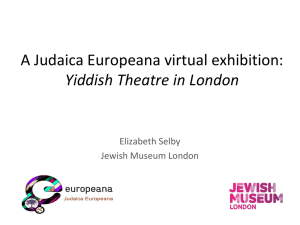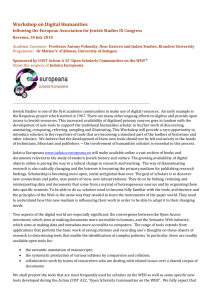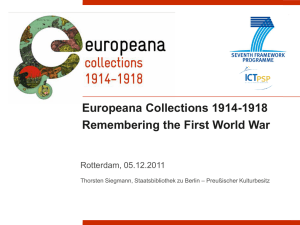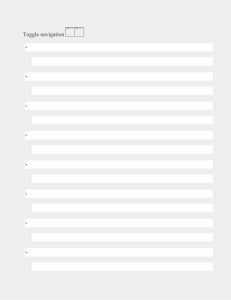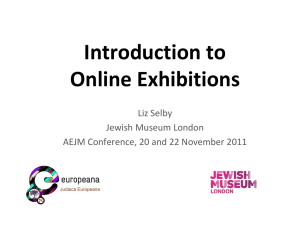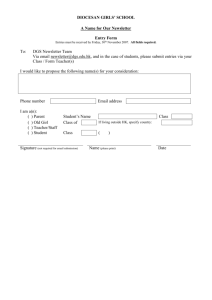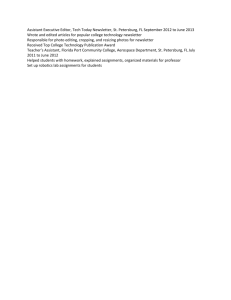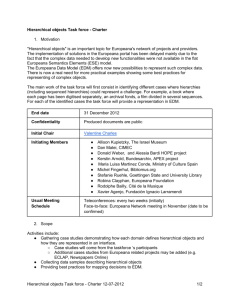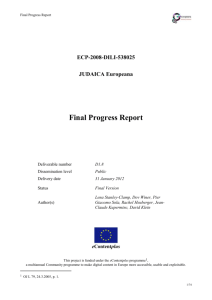1_deliverables_as_per_dow
advertisement
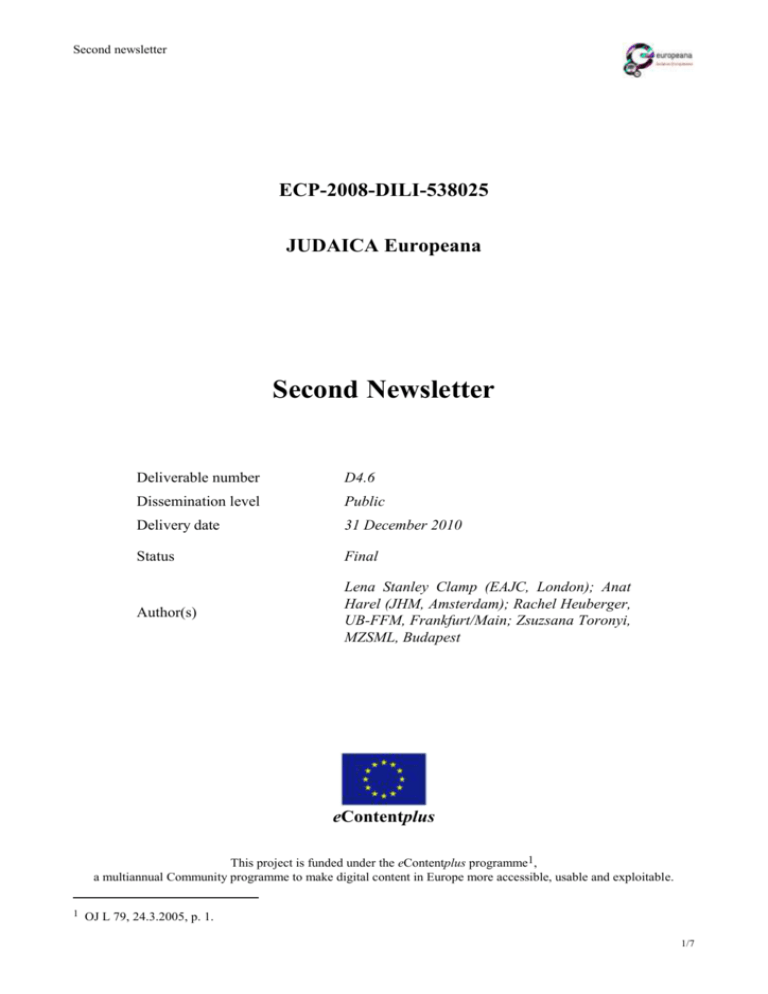
Second newsletter ECP-2008-DILI-538025 JUDAICA Europeana Second Newsletter Deliverable number D4.6 Dissemination level Public Delivery date 31 December 2010 Status Final Author(s) Lena Stanley Clamp (EAJC, London); Anat Harel (JHM, Amsterdam); Rachel Heuberger, UB-FFM, Frankfurt/Main; Zsuzsana Toronyi, MZSML, Budapest eContentplus This project is funded under the eContentplus programme1, a multiannual Community programme to make digital content in Europe more accessible, usable and exploitable. 1 OJ L 79, 24.3.2005, p. 1. 1/7 Second newsletter Table of Contents 1. SUMMARY ................................................................................................................................. 3 2. OBJECTIVES ............................................................................................................................. 4 3. STRUCTURE .............................................................................................................................. 4 4. CONTENT ................................................................................................................................. 4 4.1 INTRODUCTION: JUDAICA EUROPEANA OPENS ACCESS TO JEWISH HERITAGE 4 4.2 JUDAICA EUROPEANA PARTNERS AND THEIR COLLECTIONS 5 4.3 VIRTUAL EXHIBITIONS 5 4.4 CONFERENCES AND SEMINARS 5 5. TARGET AUDIENCES AND DISSEMINATION ................................................................. 6 ANNEX 1: JUDAICA EUROPEANA NEWSLETTER ....................................................... 7 2/7 Second newsletter 1. Summary This deliverable describes the structure, content and target audiences of the Judaica Europeana newsletter: http://www.judaica-europeana.eu/Newsletter.html 3/7 Second newsletter 2. Objectives The newsletter is a tool in the Judaica Europeana dissemination strategy whose objectives are to: 3. Raise awareness of the project and promote its results Promote the Judaica Europeana content to different constituencies in Europe and motivate scholars, teachers, students and cultural heritage professionals to turn to Judaica as a primary source. Promote Judaica Europeana and Europeana to a wider group of public and private content owners and to secure the support of Associate Partners that will contribute additional resources to the project Ensure synergy between Judaica dissemination and Europeana Structure This second online newsletter has been published on the project website in December 2010 at http://www.judaica-europeana.eu/Newsletter.html and is accessible from the main menu. The newsletter displays a dateline No.2, 2010/2011 and a headline: Judaica Europeana Jewish collections online The front page consists of four illustrated sections: Judaica Europeana Opens Access to Jewish Heritage Judaica Europeana Partners and their Collections Virtual Exhibitions Conferences and Seminars Each introductory paragraph ends with a “more about....” link to additional pages where the full narrative and more illustrations are published. At the bottom of each page there is a mechanism enabling readers to subscribe to future issues of the newsletter and a “Contact us” link for feedback. The logo of Europeana links to the Europeana portal and there is a logo and acknowledgement of the EC eContentplus programme support. The support of the Rothschild Foundation (Europe) is also acknowledged. 4. Content 4.1 Introduction: Judaica Europeana Opens Access to Jewish Heritage The first section of the newsletter highlights the continuing growth of the Judaica Europeana network, which has more than doubled since the launch of the project. It mentions the heritage institutions which have joined Judaica as Associate Partners. A link is provided to the full list of partners. The text is illustrated with colourful examples of Jewish art and objects in various collections. 4/7 Second newsletter 4.2 Judaica Europeana Partners and their Collections This section presents the collections of two of the Partners on two separate pages: the Jewish Historical Museum in Amsterdam and the Judaica Collection of the Goethe University Library in Frankfurt/Main. Each page shows objects from these collections and tells their stories. The captions complement the information provided. These highlights aim to provide an insight into the Partners’ collections which will become accessible online through Europeana. They are designed to catch the readers’ attention and encourage them to explore further by following the links. 4.3 Virtual Exhibitions Two virtual exhibitions produced by project Partners are featured in this section. ‘Jewish Postcards: Networking in Europe’ presents the postcards from the historical collection of the Hungarian Jewish Archive which have been digitized in the framework of Judaica Europeana. Dating mostly from the end of the 19th and the first half of the 20th century, the postcards became popular at the time when Jewish migration was a significant phenomenon. They were then the best way of keeping alive the connections between family members dispersed in different countries and continents. Moreover, the postcards were pictorial representations of Jews: they were the first popular media to depict Jews as they were seen. The Newsletter provides an illustrated introduction and provides a link to the exhibition. ‘Images of Greek Jews’ is a virtual exhibit from the Jewish Museum of Greece. It is a selection of 20th century photographs from the Museum’s extensive photographic archive currently being digitized in the framework of the Judaica Europeana project. Family portraits, school children, scouts and others groups from Athens, Chania, Corfu, Ioannina, Thessaloniki and Volos, before and after World War I and II, capture Greek Jews at formal occasions, school trips or simply at leisure. They convey a sense of a flourishing and well integrated community. The newsletter provides an introduction and a link to the exhibit on the museum’s website. 4.4 Conferences and Seminars This section highlights some of the Judaica Europeana dissemination events held since the publication of the first Newsletter. It focuses on the Judaica Europeana session at the IX Congress of the European Association for Jewish Studies in Ravenna and illustrates Judaica Partners’ presentations. The Digital Humanities Workshop held at this Congress is also featured as well as conferences and other events held in many different international locations. There is a link to the full list of events and some uploaded presentations published on the Events page of the website. 5/7 Second newsletter 5. Target audiences and dissemination The newsletter aims to address the following audiences: University scholars, researchers, students School teachers and students Heritage professionals including librarians; archivists, curators, cultural tourists Jewish media General public The newsletter will be disseminated by the project partners to their email lists which include the above categories of readers. It will also be sent to other specialist lists such as the members of European Association for Jewish Studies and the international H-Judaica list, as well as to our growing newsletter subscription list. We shall also seek to publicize it through Europeana, which featured the First Judaica Newsletter on its website. 6/7 Second newsletter Annex 1: Judaica Europeana Newsletter The Second Judaica Europeana Newsletter is shown in the Annex to this report as PDF pages printed from the website. 7/7
